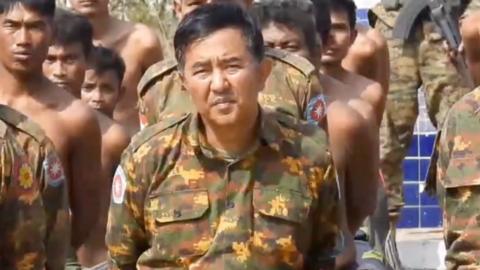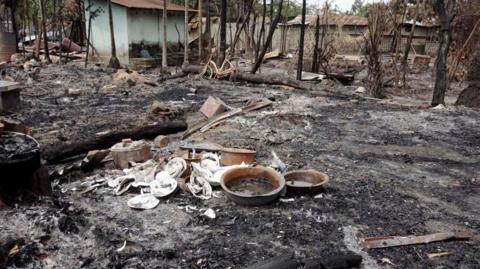Bloody siege ends Myanmar army control of western border
The army has been in headlong retreat from the Arakan Army since the beginning of the year, losing town after town.
The last army units withdrew in September to BGP5, a compound covering around 20 hectares just outside the border town of Maungdaw, where the AA laid siege.
BGP5 was built on the site of a Muslim Rohingya village, Myo Thu Gyi, which was burned down during the violent expulsion of much of the Rohingya population by the armed forces in 2017.
It was the first of many burned villages I saw on a visit to Maungdaw right after the military operation in September of that year, a mass of charred debris in among the lush tropical vegetation, its inhabitants killed or forced to flee to Bangladesh.
When I returned two years later, the new police complex had already been built, with all the trees removed, giving defenders a clear view of any attacking force.
The AA source told us their advance towards it was painfully slow, requiring the insurgents to dig their own ditches for cover.
It does not publish its own casualties. But judging from the intensity of fighting in Maungdaw, which began in June, it is likely to have lost hundreds of its own troops.
Throughout the siege, the Myanmar air force kept up a constant bombardment of Maungdaw, driving the last civilians out of the town.
Its planes dropped supplies to the besieged soldiers at night, but it was never enough. They had plenty of rice stored in the bunkers, a local source told us, but they could not get any treatment for their injuries, and the soldiers became demoralised.
They started to surrender last weekend.
AA video shows them coming out in a pitiful state, waving white cloths. Some are hobbling on makeshift crutches, or hopping, their injured legs wrapped in rags. Few are wearing shoes.
Inside the wrecked buildings the victorious insurgents filmed piles of bodies.
The AA says more than 450 soldiers died in the siege. It has published images of the captured commander, Brigadier-General Thurein Tun, and his officers kneeling beneath the flagpole, now flying the insurgents' banner.

Pro-military commentators in Myanmar have been venting their frustration on social media.
"Min Aung Hlaing, you have not asked any of your children to serve in the military," wrote one. "Is this how you use us? Are you happy seeing all those deaths in Rakhine?"
"At this rate, all that will be left of the Tatmadaw [military] will be Min Aung Hlaing and a flagpole," wrote another.
The capture of BGP5 also shows the Arakan Army to be one of the most effective fighting forces in Myanmar.
Formed only in 2009 – much later than most of Myanmar's other insurgent groups – by young ethnic Rakhine men who had migrated to the Chinese border on the other side of the country in search of work, the AA is part of the Three Brotherhood Alliance which has inflicted most of the defeats suffered by the junta since last year.
The other two members of the alliance have stayed on the border, in Shan State.
But the AA moved back to Rakhine eight years ago to start its armed campaign for self-government, tapping into historic resentment among the Rakhine population of the poverty, isolation and central government neglect of their state.
The AA leaders have proven to be smart, disciplined and able to motivate their fighters.
They are already administering the large areas of Rakhine State they control as though they were running their own state.
And they also have good weapons, thanks to their links with the older insurgent groups on the Chinese border, and appear to be well-funded.
There is a bigger question, though, over how much the various ethnic insurgent groups are willing to prioritise the goal of overthrowing the military junta.
Publicly they say they do, alongside the shadow government which was deposed by the coup, and the hundreds of volunteer peoples' defence forces which have sprung up to support it.
In return for the support it is getting from the ethnic insurgents, the shadow government is promising a new federal political system which will give Myanmar's regions self-rule.
But already the other two members of the Three Brotherhood Alliance have accepted China's request for a ceasefire.
China is seeking a negotiated end to the civil war which would almost certainly leave the military with much of its power intact.
